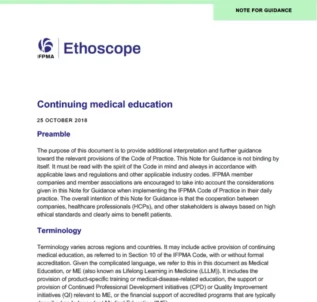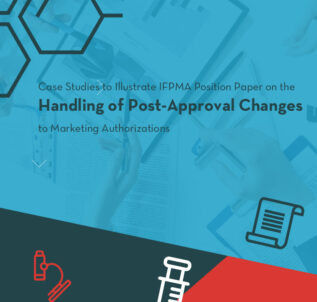
This oped was first published first on PharmaBoardroom on 12 December 2018. At least half of the world’s population cannot obtain essential health services, according to a 2017 report from the World Bank and World Health Organization[1]. And each year, large numbers of households are being pushed into poverty because they must pay for...
Read moreGeneva, 10 December 2018 – IFPMA, the global research-based biopharmaceutical industry association, is pleased to announce Ms Unjela Kaleem as its new Director of Communications. Based in Geneva, IFPMA has official relations with the United Nations and engages with multiple states platforms such as G7, G20 and OECD and contributes industry expertise to help the...
Read moreThis oped was first published in The Pharma Letter on 6 December 2018. Business performance is mostly about the tangible: robust pipeline, successful launches, development of sales, financial results, profit margins, and the like. One less tangible but absolutely crucial measure of success relates to “how” we go about our business. Ethics and building trust...
Read moreThe purpose of this document is to provide guidance to pharmaceutical companies to ensure that their involvement in the provision of Medical Education meets high standards.
Read more
New R&D biopharmaceutical industry Code of Practice comes into effect on 1 January 2019. Changes reflect increasingly complex dilemmas faced by R&D biopharmaceutical industry professionals which call just as much for rules, as for strong ethical values that can build a culture of trust. New Code of Practice aims to improve guidance to IFPMA members...
Read moreDavid A. Ricks, Chairman and Chief Executive Officer, Eli Lilly and Company, takes over as President of IFPMA from Ian C. Read, Chairman of the Board and Chief Executive Officer, Pfizer. New President to highlight the need for forward-looking policies that encourage innovation, as well as strengthened health systems in order to sustain the last-half...
Read moreThis brochure describes the complexity with handling such regulatory activities, and the impact it has on access to such medicinal products. It is supported by six illustrative case studies aimed at raising awareness about the current challenges of PACs regulations and demonstrating how the consistent and predictable management of PACs can enhance public health overall. This represents an opportunity for all relevant stakeholders to partner and ensure patients’ timely access to innovative medicines.
Read more
16 November, Geneva – The International Federation of Pharmaceutical Manufacturers and Associations (IFPMA) draws attention on the urgent need for governments across the world to put in place a suite of incentives to reinvigorate the antimicrobial pipeline. Adoption by governments of sustainable and substantial measures to fund or reward research inputs and outputs incentives must...
Read moreThis oped was first published in the Antimicrobial Resistance campaign in the Guardian on 12 November 2018 Antimicrobial resistance (AMR) is on course to overtake cancer and account for 10m deaths a year by 2050. Already, 700,000 people die from drug-resistant infections (“superbugs”) each year. AMR could cost the global economy up $100 trillion...
Read moreThe AMR Industry Alliance has made major strides in 2018 taking action across four different areas to tackle the public health threat of AMR: research and science, access, appropriate use, and manufacturing and the environment. In 2018, it has published its first progress report that provides unique insights into the practical steps its members are...
Read moreRead more